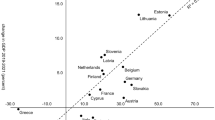Abstract
This paper explores the dominant role of politics in decisions made by euro area governments during the crisis. Decisions that appear to have been driven by local political considerations to the detriment of the euro area as a whole are discussed. The domination of politics over economics has led to crisis mismanagement. The underlying cause of tension is identified as a misalignment of political incentives. Member state governments tend to defend their own interests in a noncooperative manner. This has magnified the costs of the crisis and has resulted in an unbalanced and divisive incidence of the costs across the euro area. The example of Cyprus is discussed, where political decisions resulted in a transfer of about half of 2013 GDP from the island to cover losses elsewhere. In the absence of a federal government, no institution can adequately defend the interests of the euro area as a whole. European institutions appear weak and incapable of defending European principles and the proper functioning of the euro. Political reform is needed to sustain the euro but this is unlikely to pass the political feasibility test with the current governments of Europe.






Similar content being viewed by others
Notes
By necessity the review is brief and eclectic. A large literature discusses in detail the history of the euro area and various economic and political aspects of the crisis. See e.g. Goodhart (2011), Bini-Smaghi (2013), Soros (2014), and the Symposium on the euro, published in the Summer 2013 issue of the Journal of Economic Perspectives, and references therein (Spolaore 2013; Fernandez-Villaverde et al. 2013; O’Rourke and Taylor 2013; and Schmitt-Grohe and Martin Uribe 2013).
Sargent’s (2011) Nobel lecture highlighted the similarities of the dysfunction of the euro area with the US under the Articles of Confederation.
The disclosure of the minutes of the IMF Board meeting on 10 May 2010 is quite revealing in this regard. The minutes suggest that some directors thought that a restructuring of Greek sovereign debt was advisable at that time. But this was opposed by others, in favor of an alternative plan that included the maintenance of exposures by banks in numerous countries which reduced the risks IMF staff had identified. The minutes note that: “The Dutch, French, and German chairs conveyed to the Board the commitments of their commercial banks to support Greece and broadly maintain their exposure.” (International Monetary Fund 2010, p. 3.) As is well known, in the Summer and Fall of 2011 the German government led the effort to impose a severe haircut on Greek sovereign debt. The exposure of German banks to Greek sovereign debt had been significantly reduced by then, despite the commitments made in May 2010.
The decision was accepted at the European Council meeting in Brussels on 28–29 October 2010. The President of the ECB is also invited at these meetings. ECB objections were communicated at that meeting by ECB President Trichet. See Orphanides (forthcoming) for additional discussion.
As usual in European politics, the language used was more circumspect. The confiscation of deposits was described as a “stability levy” and the collective decision was presented as a “Cypriot authorities’ commitment” that was welcomed by other parties to the agreement (Eurogroup 2013).
This section draws on Orphanides (2014), where more details are provided.
A historical overview of the economy is collected in Orphanides and Syrichas (2012).
The government asked for assistance on the same day as Spain. In the case of Spain a program was finalized within three weeks.
To be sure, banks have been an easy target for politicians everywhere in Europe during the crisis. A key difference is that in other countries governments criticized banks while providing support to avoid damaging the economy, when needed. In Cyprus the government not only criticized banks, it deliberately inflicted damage for political purposes.
For example, Government Spokesman Stefanos Stefanou stated on 31 May 2012: “The basic problem facing the Cypriot economy is the large exposure of Cypriot banks to Greek government bonds, whether some want to hear it here in Cyprus or not” (author translation, quoted in Michaelides 2012).
The exaggeration was achieved mainly by subjecting banks to a stress test used to estimate potential future losses. PIMCO was selected as a consultant for the exercise, but the central bank guided the methodology and key assumptions which were out of line with similar exercises. Zenios (2013, 2014) presents alternative estimates.
Concerns regarding sustainability would not have arisen without the exaggeration. Based on the exaggerated capital needs, the debt to GDP ratio could reach 140 % before declining. Assistance to banks enters such calculations even if it is temporary and the methodology does not account for the fact that the government can recoup its investment in banks where capital is injected in subsequent years.
The German elections would not have been a factor had the Cypriot government completed negotiations for a program in July 2012, along with Spain, or earlier, instead of seeking financial assistance from Russia. See also Apostolides (2013).
EU member states not in the euro area do not face this threat because they are not bound together by the common currency. Germany does not have veto power on IMF programs for countries that are not in the euro area.
FDP, the junior partner in Germany’s ruling coalition, consistently took an anti-European stance during the crisis and generally opposed support programs.
The performance of member states regarding the effort to combat money laundering is being monitored in Europe by the Financial Action Task Force (FATF). The compliance with recommendations to deter criminal activity is reviewed periodically in each country. According to the available reports as of the end of 2012, Cyprus had a considerably better compliance record than both Germany as well as key financial centers in Europe, such as the Netherlands and Luxemburg. For example, Cyprus was the only country among these four that had been found in compliance, at least partially, with all 49 FATF recommendations, and fully with 12 recommendations. By contrast, Germany was deemed non-compliant with 5 recommendations and was fully compliant with only 5.
Cyprus was not the first country where Germany introduced discussions about changing the corporate tax rate of a country seeking assistance. Ireland was an earlier example.
This is because the sale price was based on the valuation of assets that had been used to exaggerate the capital needs of the banks. The exaggeration was achieved by undervaluing bank assets so a sale of these assets based on these valuations was equivalent to a transfer.
As a result of this transfer, the negative equity position of Piraeus Bank was reversed, from −2.7 billion euro on 31 December 2012 to +0.9 billion euro on 31 March 2013.
Orphanides (2013) examines the role of these considerations for some controversial decisions taken by the ECB.
This risk was recognized by some analysts even before the creation of the euro area. A prominent example is Connolly (1995) who titled his insightful insider account: The Rotten Heart of Europe.
References
Apostolides, A. (2013). Beware of German gifts near elections: how Cyprus got here and why it is currently more out than in the Eurozone. Capital Markets Law Journal, 8(3), 300–318.
Bini-Smaghi, L. (2013). Austerity: European democracies against the wall. Brussels: CEPS.
Boysen-Hogrefe, J. (2012). Die Zinslast des Bundes in der Schuldenkrise: Wie lukrativ ist der “sichere Hafen”? Kiel Insttute for the World Economy, working paper 1780, July. (In German).
Breidthardt, A., & O’Donnell, J. (2013). Insight: How Europe stumbled into scheme to punish Cyprus savers. Reuters, 18 March.
Broyer, C., Petersen, A.-K., & Schneider, R. (2012). Impact of the euro crisis on the German economy. Allianz working paper 154, September.
Connolly, B. (1995). The rotten heart of Europe: The dirty war for Europe’s money. London: Faber and Faber.
Council of the European Union. (2008). Brussels European Council, Presidency Conclusions. 16 October.
Demetriades, P. (2012). Cyprus financial crisis: the framework for an economic recovery within the eurozone. 11 December.
Eurogroup. (2013). Eurogroup Statement on Cyprus. 16 March.
Fernandez-Villaverde, J., Garicano, L., & Santos, T. (2013). Political credit cycles: the case of the Eurozone. Journal of Economic Perspectives, 27(3), 145–166. Summer.
Goodhart, C. (2011). Europe after the crisis. Institute for new economic thinking, October.
International Monetary Fund. (2010). Board meeting on Greece’s request for an SBA—May 9, 2010. Office Memorandum, 10 May.
Michaelides, A. (2014). What Happened in Cyprus? working paper, May.
Michaelides, A. (2012). Who is threatened with default. Phileleftheros, 6 June. (In Greek).
Neuger, J. (2013). Europe plays I-didn’t-do-it blame game on Cyprus bank tax. Bloomberg, 20 March.
O’Rourke, K., & Taylor, A. M. (2013). Cross of Euros. Journal of Economic Perspectives, 27(3), 167–192. Summer.
Orphanides, A. (2012). State aid in the banking market and the Euro area crisis: Towards a Banking Union. Remarks at the conference on state aid in the banking market—legal and economic perspectives, House of Finance, Goethe University, Frankfurt, 21 June.
Orphanides, A. (2013). The politics of the euro area crisis and ECB monetary policy. In Central Banking: Where are we Headed’? Edited by Helmut Siekmann and Volker Wieland, IMFS Interdisciplinary Studies in Monetary and Financial Stability 2/2013.
Orphanides, A. (2014). What happened in Cyprus? The economic consequences of the last communist government in Europe, working paper, May.
Orphanides, A. (forthcoming). The Sovereign Debt Crisis in the Euro Area. Ekonomia.
Orphanides, A., & Syrichas, G. (2012). The Cyprus economy: Historical review, prospects and challenges. Nicosia: Central Bank of Cyprus.
Peel, Q. (2013). German parties voice approval for harsh terms of Cyprus bail out. Financial Times, 16 March.
Piraeus Bank. (2013). Financial statements information for the period from 1st January 2013 to 31st March 2013, 20 May.
Sargent, T. (2011). United States then, Europe now. The Nobel lecture, delivered in Stockholm on 8 December.
Schmidt, H. (2011). Farewell event for Jean-Claude Trichet. Frankfurt, 19 October.
Schmitt-Grohe, S., & Uribe, M. (2013). Downward nominal wage rigidity and the case for temporary inflation in the Eurozone. Journal of Economic Perspectives, 27(3), 193–212. Summer.
Soros, G. (2014). The tragedy of the European Union: Disintegration or revival. New York: PublicAffairs.
Spiegel, P. (2013). Cyprus depositor’s fate sealed in Berlin. Financial Times, 17 March.
Spolaore, E. (2013). What is European integration really about? A political guide for economists. Journal of Economic Perspectives, 27(3), 125–144. Summer.
Steinhauser, G., Stevis, M., & Walker, M. (2013). Cyprus rescue risks backlash. Wall Street Journal, 17 March.
Temin, P., & Vines, D. (2013). The leaderless economy: Why the world economic system fell apart and how to fix it. Princeton: Princeton University Press.
Zenios, S. (2013). The collapse of the Cyprus economy: From misjudgment to mismanagement. Report to the Special Investigation Committee for the Cyprus economy. Nicosia, September. (In Greek.)
Zenios, S. (2014). Fairness and reflexivity in the Cyprus bail-in. The Wharton Financial Institutions Center, Working Paper 14–04, March.
Acknowledgments
The 2013 William S. Vickrey Distinguished Address presented at the International Atlantic Economic Society Conference in Philadelphia, 11 October 2013. I would like to thank the participants of the IAES conference as well as participants of related presentations at the Federal Reserve Bank of St Louis, the Federal Reserve Bank of Boston, the Swiss National Bank, the Banque de France, the European Central Bank, the National Bank of Belgium, the Austrian National Bank, the Swedish House of Finance and SNS, the University of Frankfurt, Harvard University, Boston College, Claremont-McKenna College and MIT for helpful discussions and comments.
Author information
Authors and Affiliations
Corresponding author
Rights and permissions
About this article
Cite this article
Orphanides, A. The Euro Area Crisis: Politics over Economics. Atl Econ J 42, 243–263 (2014). https://doi.org/10.1007/s11293-014-9419-1
Published:
Issue Date:
DOI: https://doi.org/10.1007/s11293-014-9419-1




